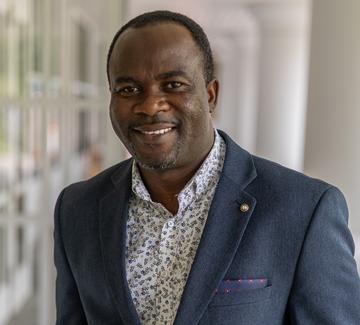Asst. Prof. Nelson Y. Dzade at Penn State
Black History Month

Over Black History Month, we caught up with Nelson Y. Dzade, Assistant Professor of Energy and Mineral Engineering and Chair of the Undergraduate Energy Engineering Program at Penn State.
Who has inspired you in science?
I’ve been inspired by scientists who combine curiosity with real-world impact. For example, Albert Einstein has greatly inspired me due to his extraordinary curiosity and ability to think differently. He challenged conventional ideas, posed profound questions about the universe, and demonstrated that creativity and persistence are just as crucial as technical knowledge in driving breakthroughs. His work reminds me to approach problems with both rigor and imagination, which is something I try to bring to my own research. My philosophy and motivation have been largely shaped by one of Albert Einstein’s quotes — “A hundred times every day I remind myself that my inner and outer life are based on the labors of other men and women, living and dead, and that I must exert myself in order to give in the same measure as I have received and am still receiving”. This teaches the vital truth that we must be human first, scientist second! Showing that you care (extending kindness, showing care, and investing in stronger relationships) is more important than showing you are perfect.
Why did you choose science as a career?
I chose science as a career because I’ve always been driven by curiosity and the desire to understand how things work. Science gives me the tools to ask meaningful questions and find evidence-based answers that can make a real difference in people’s lives. Most importantly, I chose a career in materials science and chemistry because these disciplines combine my curiosity about how things work at the atomic level with my interest in creating practical solutions for real-world challenges. Our standard of living today has been shaped primarily by past discoveries of new materials, and our future prosperity will depend mainly on the fruits of contemporary research into even more advanced materials with unparalleled performance. Advances in materials science and chemistry enable technological revolutions. I’m fascinated by the idea that by understanding and manipulating the chemistry of materials, we can develop stronger, more sustainable, or more efficient materials that can shape entirely new industries — from electronics and batteries to healthcare and renewable energy.
What are the biggest challenges you faced in your early career?
Early-career scientists face numerous challenges. One of the biggest challenges I faced early in my career was establishing my identity and direction — figuring out who I wanted to be as a researcher and what I wanted my work to stand for. Early on, you’re often balancing learning from others with trying to develop your own ideas and approach. It can take time to find your voice, build confidence in your expertise, and define the area where you can make the most impact. Materials science is uniquely an interdisciplinary field, so it can take time to find your niche. The transition from supervised to independent research – early-career scientists are typically left to their own. You must learn how to design your own experiments, secure competitive funding, mentor your students, and handle setbacks when results don’t go as planned – these are usually very challenging. However, I believe that this process is also one of the most rewarding aspects of an early scientific career — it encourages you to grow, think creatively, take ownership of your work, and discover what truly inspires you.
Why do you think there is a lack of diversity in senior positions in STEM?
The lack of diversity in senior positions in STEM comes from a combination of historical and structural factors. For a long time, access to opportunities in science wasn’t equal — especially for women and people from underrepresented backgrounds. That means fewer people from those groups were able to enter the field, build networks, and advance to leadership roles. Even today, challenges such as unconscious bias, unequal mentorship, and limited visibility of diverse role models can hinder talented scientists' progress up the career ladder. The good news is that awareness is growing, and many institutions are actively working to create more inclusive environments through mentorship, outreach, and equitable hiring practices. Increasing diversity isn’t just about fairness; it also strengthens the field by bringing in new perspectives and ideas.
What are you working on now?
My research group (Materials and Minerals Theory Group) tackles and unravels complex surface and interfacial phenomena in energy conversion and storage materials. We specialize in developing new intuitions, or “design rules,” that connect emergent properties and function to chemical composition and structure. We harness the predictive power of multiscale materials modeling and machine learning approaches to unravel structure-property-performance relationships in solid-state materials and minerals for applications in solar cells, batteries, and photo(electro)catalysis. Our current research projects involve modelling interfacial phenomena in thin-film solar cells (predicting structure, stability, and properties of heterojunctions); rational design of earth-abundant photo(electro)catalyst for green hydrogen production and CO2 conversion to valuable fuels and chemicals; designing effective cathode host materials to suppress the shuttle effect problem in lithium sulfur batteries; and designing eco-friendly collectors for mineral beneficiation. We interact closely with leading experimental research groups nationally and internationally to guide and be inspired by state-of-the-art studies of real physical systems, and to validate and further develop a deeper fundamental understanding of materials properties and their modulation for performance enhancement.
What advice would you give to someone starting out in STEM research today?
My advice for someone starting in STEM research today would be to stay curious and persistent. Ask the right questions, explore new ideas, and don’t be afraid to make mistakes — failure is part of the learning process. It’s also important to find good mentors, build a supportive network, and collaborate with others - don't compete! Great mentors will help accelerate your career growth (they can guide you through your early career and beyond). I have been fortunate enough to have had some amazing mentors, such as Professor Nora de Leeuw and Professor Sir Richard Catlow (my PhD advisors), as well as many others who have been instrumental in shaping me as a person. Also, developing both your technical skills and communication skills will help you grow as a researcher. Finally, try to work on problems that genuinely excite you, because passion is what sustains long-term success in science.
Author:
Nelson Y. Dzade, Ph.D.
Assistant Professor of Energy and Mineral Engineering
Virginia S. & Philip L. Walker, Jr. Faculty Fellow of Materials Science and Engineering & Fuel Sciences
Chair of the Undergraduate Energy Engineering Program at Penn State
Co-Director of Alliance for Education, Science, Engineering, and Design with Africa (AESEDA)
Research Group: Materials and Minerals Theory Group
The Pennsylvania State University, Department of Energy and Mineral Engineering, University Park, U.S.A


